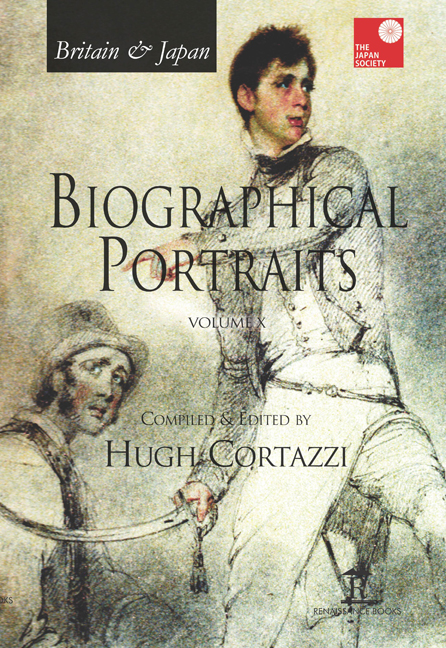Book contents
- Frontmatter
- Dedication
- Contents
- Introduction
- List of Contributors
- Index of Biographical Portraits in Japan Society Volumes
- PART I BRITAIN IN JAPAN
- PART II JAPAN IN BRITAIN
- Select Bibliography of Works in English on Anglo-Japanese Relations [Compiled by Gill Goddard – Retired East Asian Studies Librarian, University of Sheffield]
- Select Bibliography of Works in Japanese on Anglo-Japanese Relations [Compiled by Akira Hirano, SISJAC]
- Index
15 - Barclay Fowell Buxton (1860–1946): Evangelistic Missionary in Japan
Published online by Cambridge University Press: 07 May 2022
- Frontmatter
- Dedication
- Contents
- Introduction
- List of Contributors
- Index of Biographical Portraits in Japan Society Volumes
- PART I BRITAIN IN JAPAN
- PART II JAPAN IN BRITAIN
- Select Bibliography of Works in English on Anglo-Japanese Relations [Compiled by Gill Goddard – Retired East Asian Studies Librarian, University of Sheffield]
- Select Bibliography of Works in Japanese on Anglo-Japanese Relations [Compiled by Akira Hirano, SISJAC]
- Index
Summary
INTRODUCTION
BARCLAY FOWELL BUXTON (1860–1946) was an independent evangelistic missionary associated with the Church Missionary Society (CMS) who first came out to Japan in 1890. He is best-known for creating the Matsue Christian Band and forming in 1903, at the Keswick Convention, the Japan Evangelistic Band (JEB, Nihon Dendôtai), an evangelistic missionary organization, with his colleague, Alpheus Paget Wilkes (1871–1934). Cyril Powles has noted that ‘British missionary societies reflected the tendency of Englishmen to form voluntary associations for specific purposes,’ and Buxton and Paget Wilkes in establishing the JEB were certainly conforming to that. The JEB stressed pure evangelism. In 1913 Buxton wrote that he believed that Japan ‘does not need a ritualistic religion for she already has one. She does not need an intellectual Gospel, for she has found that education, alone, does not transform and build character. She wants the religion of God who answers by Fire.’ For Buxton, ‘Fire’ was the living, personal, Holy Spirit, which was God's great answer to all real prayer. He was an evangelist first and foremost, and not interested in creating brick and mortar institutions. This essay focuses on his first years in Japan when he was still a CMS missionary, and the formation of the Matsue Christian Band.
Barclay Buxton, while he was extraordinary in the scope of his activity which ultimately went beyond the CMS in Japan and the Church of England, fits into a pattern of British Anglican missionary activity in Meiji and Taishō Japan. Missionary work was often a family affair, with husbands and wives, fathers, sons and daughters, brothers and sisters, friends and extended family serving in the mission field or manning support organizations at home aimed at engendering financial giving or continued interest in a specific mission or project. Among Buxton's missionary contemporaries, the Hutchinsons, the Shaws, and the Warrens were missionary families where sons followed fathers into the Japan mission field. Even more common were combinations of fathers and daughters or brothers and sisters, which would include only looking at the beginning of the alphabet of British Anglicans serving in Japan: Andrews, Bosanquet, Boutflower, Burnside, Buxton, Cockram. Ensor and Foss.
- Type
- Chapter
- Information
- Britain & Japan Biographical Portraits Vol X , pp. 177 - 186Publisher: Amsterdam University PressPrint publication year: 2016

